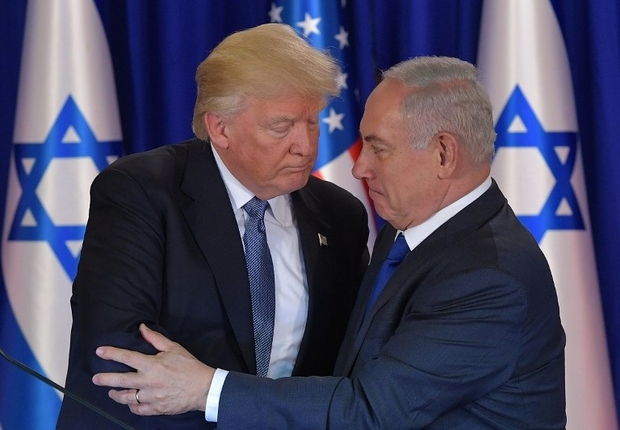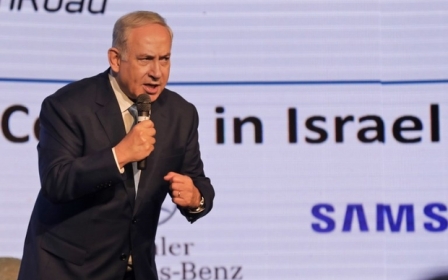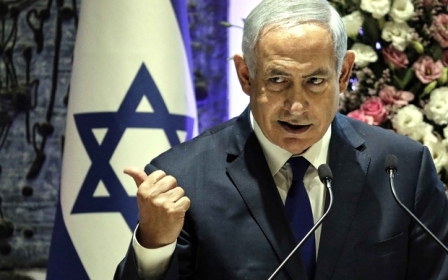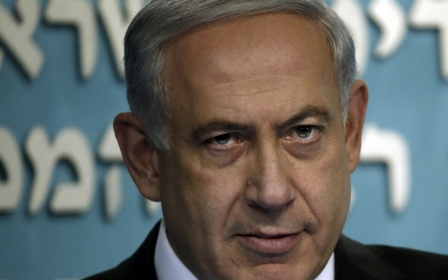Netanyahu, Trump and AIPAC: What to expect

NEW YORK, United States – In general, the advice for an embattled political chief is to hole up in your capital, stiffen your lip and duke it out with adversaries. Not so for Israeli Prime Minister Benjamin Netanyahu, who flies to Washington this weekend as corruption allegations against him gain momentum.
This bucks conventional wisdom, but the visit also affords Netanyahu a golden opportunity to earn some much-needed statesmanship points and bask in the glories of a White House drop-in and the annual confab of America’s biggest pro-Israel lobby.
Back in Israel, police say they have enough evidence to charge Netanyahu in two corruption probes – for receiving $300,000 worth of goodies from rich businessmen and plotting to secure praise from one Israeli newspaper by curtailing the circulation of a rival daily. He denies this.
Ahead of the trip, Middle East Eye picked out what to watch on Monday during Netanyahu’s face-time with US President Donald Trump and his speech at the American Israel Public Affairs Committee (AIPAC) meeting, which runs from Sunday to Tuesday.
Bibi hopes US visit leverages popularity
The corruption allegations started to look more damaging on 21 February, when Shlomo Filber, a confidant of Netanyahu in Israel’s communication ministry, reportedly agreed to turn state’s witness against his former boss.
Speculation is rife that Netanyahu, 68, a giant of Israeli politics who has been in power since 2009, will call a snap election to try and stall the legal proceedings during the campaign and rally his right-wing power base behind him.
For Michael Koplow, an expert at the Israel Policy Forum, a think-tank, the Washington jaunt allows Netanyahu to leverage his popularity in America against the corruption claims besetting him back home.
“Netanyahu argues that his unique history with the US and his unparalleled popularity among American Jews make him the only Israeli politician who can capitalise on the tight bond between the US and Israel in a way that maximises Israeli interests,” Koplow told MEE.
He will tout the narrative that Washington’s recent decisions to cut Palestinian funding, to recognise Jerusalem as Israel’s capital and relocate the US embassy there would not have occurred under another Israeli premier, said Koplow.
It’s not an easy manoeuvre, but Netanyahu is a polished A-lister who will doubtless use his chummy relations with the Trump gang and the feel for US politics he gained while studying and working stateside to full effect.
“He will need to be flawless in using the optics of his meeting with Trump to boost himself politically,” added Koplow.
Promote peace plan?
Trump was dangling the prospect of a Middle East peace plan when he addressed AIPAC back in March 2016 during the election campaign. Administration officials now talk of unveiling their Israeli-Palestinian settlement blueprint “soon”.
Only a handful of folks, like Middle East envoy Jason Greenblatt and Trump’s son-in-law and senior adviser, Jared Kushner, are privy to it. Analysts will be scouring for tell-tale signals after Netanyahu sits down with Trump on Monday.
For Jonathan Cristol, a scholar at the World Policy Institute, a think-tank, it will resemble previous deals. What’s new is the pressure that can be exerted on Palestinians via an alignment of Israel, the US and Arab states through their shared fears over Iran.
“I’m not convinced that there is such a plan at all, but if there is one, I imagine it will look very similar, if not identical, to previous plans that have been on the table and it will ultimately go nowhere,” Cristol told MEE.
The long-awaited proposal is already on shaky ground. Palestinian President Mahmoud Abbas has rejected US-led mediation efforts as “impossible” since Washington’s decision to shift its Israeli embassy to Jerusalem from Tel Aviv.
It became more precarious this week when one of its architects, Kushner, lost his access to the most valued US intelligence report on hotspots in the Middle East and elsewhere as the White House cracked down on security clearances.
While in the Oval Office, Netanyahu will try to cement recent Israeli gains, perhaps even asking Trump for a green light to annex Jewish settlements in the occupied West Bank and deliver fodder to right-wingers in his coalition, added Koplow.
Liberals leaving the lobby?
AIPAC prides itself on having broad support among Democrats and Republicans – providing a failsafe that money, arms and diplomatic support keep on flowing to the Jewish state, whoever lives in the West Wing.
Not so, says Seth Morrison, from the foreign policy campaign group Jewish Voice for Peace, pointing to recent data from Pew Research Center suggesting that bipartisan support for Israel is eroding.
“An increasing number of Democrats are realising that Israel is not such a wonderful ally, and is in fact making the situation in the Middle East worse. They are no longer blindly supporting Israel,” Morrison told MEE.
A survey last month found that 79 percent of Republicans say they sympathise more with Israel than the Palestinians, compared with just 27 percent of Democrats – a divide that has widened these past two decades, researchers said.
The same goes for Netanyahu. Nearly three times as many Republicans (52 percent) as Democrats (18 percent) have favourable impressions of Israel’s conservative leader.
Public opinion is moving, and the AIPAC speaker list may lag behind, added Morrison.
On the right, 2018 orators include such Trump administration heavyweights as Vice President Mike Pence, UN envoy Nikki Haley and ambassador to Israel David Friedman as well Republican hardliners like one-time UN envoy John Bolton.
But the liberal contingent is also strong, boasting Democrat lawmaker Adam Schiff, Hillary Clinton’s former aide Jake Sullivan and Ilan Goldberg, who worked with former secretary of state John Kerry on a previous round of doomed Israeli-Palestinian talks.
Analysts note, however, that those better-positioned to secure the Democratic nomination for the 2020 election – the likes of Joe Biden, Bernie Sanders, Elizabeth Warren and Kamala Harris – will not grace AIPAC with their presence this year.
While AIPAC takes a hardline on Iran and lobbies Washington to scrap the 2015 nuclear deal with Tehran, the annual confab of about 18,000 pro-Israel Americans, lawmakers and policy wonks still holds sway on both sides of the aisle, said Cristol.
“It’s sort of trendy to claim that support for Israel is waning in the US, but the numbers don’t necessarily bear that out,” Cristol told MEE.
Middle East Eye propose une couverture et une analyse indépendantes et incomparables du Moyen-Orient, de l’Afrique du Nord et d’autres régions du monde. Pour en savoir plus sur la reprise de ce contenu et les frais qui s’appliquent, veuillez remplir ce formulaire [en anglais]. Pour en savoir plus sur MEE, cliquez ici [en anglais].




